The books in this week’s column take readers on imaginative adventures that tell the tales of people whose lives have been changed by books. Set in libraries, bookshops, and classrooms, these intriguing stories whet the appetite for more reading, and inspire readers to share the wondrous world of books with others.
Ages 4–8
Baabwaa & Wooliam. David Elliott. Ill. Melissa Sweet. 2017. Candlewick.
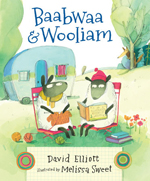 Baabwaa is a sheep who loves knitting. Wooliam is a sheep who loves reading. Inspired by the story Wooliam’s reading, they set off seeking adventure. Nothing exciting happens until they are approached by another sheep—one with a long tail, a toothy snout, and an unkempt fleece. Wooliam recognizes the stranger as the Wolf in Sheep’s Clothing he’s read about, and the chase is on. Their adventure takes an unexpected turn with Baabwaa and Woolliam returning to knitting and reading and the wolf discovering the joy of reading (although there are still frequent interruptions for chasing). Sweet’s colorful and expressive illustrations, done in watercolor, gouache, and mixed media, add to the fun of this entertaining tale of an unlikely friendship.
Baabwaa is a sheep who loves knitting. Wooliam is a sheep who loves reading. Inspired by the story Wooliam’s reading, they set off seeking adventure. Nothing exciting happens until they are approached by another sheep—one with a long tail, a toothy snout, and an unkempt fleece. Wooliam recognizes the stranger as the Wolf in Sheep’s Clothing he’s read about, and the chase is on. Their adventure takes an unexpected turn with Baabwaa and Woolliam returning to knitting and reading and the wolf discovering the joy of reading (although there are still frequent interruptions for chasing). Sweet’s colorful and expressive illustrations, done in watercolor, gouache, and mixed media, add to the fun of this entertaining tale of an unlikely friendship.
—CA
A Place to Read. Leigh Hodgkinson. 2017. Bloomsbury.
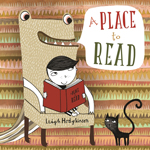 A young boy is searching for the perfect place to sit for a bit to read. The playful rhyming text and mixed media-and-digital collage illustrate the boy’s search for the perfect chair. Observant readers will notice creatures that appear as the boy keeps rejecting chairs until he finally realizes that it doesn’t matter where you read a book. A final double-page depicts him lying on the floor, reading to all the creatures, as he declares, “. . . a book is best anywhere . . . /a book is best when you SHARE.”
A young boy is searching for the perfect place to sit for a bit to read. The playful rhyming text and mixed media-and-digital collage illustrate the boy’s search for the perfect chair. Observant readers will notice creatures that appear as the boy keeps rejecting chairs until he finally realizes that it doesn’t matter where you read a book. A final double-page depicts him lying on the floor, reading to all the creatures, as he declares, “. . . a book is best anywhere . . . /a book is best when you SHARE.”
—CA
Robinson. Peter Sís. 2017. Scholastic.
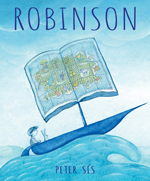 When Peter, the narrator, and his adventure-loving friends make plans to go to the school costume party as pirates, his mother has another idea. She creates a furry outfit that transforms Peter into the hero of his favorite adventure story, Robinson Crusoe. At the party, all his pirate-costumed friends make fun of his costume. Back home and tucked in bed, he begins to dream. A series of exquisite double-page spreads and sequential panels show Peter cast upon a lush, colorful island where he survives as a strong and brave Robinson Crusoe. Just as pirates arrive on the island, Peter awakes in his bedroom to find his friends eager to play and hear more about Robinson Crusoe. In an author’s note, Sís tells how this book was inspired by remembrance of a childhood experience in which his mother dressed him up as one of his favorite storybook characters for a costume contest. The accompanying photograph shows the young Sís in his Robinson Crusoe costume.
When Peter, the narrator, and his adventure-loving friends make plans to go to the school costume party as pirates, his mother has another idea. She creates a furry outfit that transforms Peter into the hero of his favorite adventure story, Robinson Crusoe. At the party, all his pirate-costumed friends make fun of his costume. Back home and tucked in bed, he begins to dream. A series of exquisite double-page spreads and sequential panels show Peter cast upon a lush, colorful island where he survives as a strong and brave Robinson Crusoe. Just as pirates arrive on the island, Peter awakes in his bedroom to find his friends eager to play and hear more about Robinson Crusoe. In an author’s note, Sís tells how this book was inspired by remembrance of a childhood experience in which his mother dressed him up as one of his favorite storybook characters for a costume contest. The accompanying photograph shows the young Sís in his Robinson Crusoe costume.
—CA
This Book Will Not Be Fun. Cirocco Dunlap. Ill. Olivier Tallec. 2017. Random House.
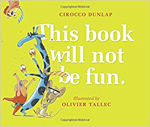 As the Word-Eating Flying Whale makes an appearance to snack on a few words, a mouse who likes “boring things” addresses the reader, stating, “This book will not be fun.” Then, a worm materializes on the whale’s fin, transforming into a Glow-in-the-Dark Kung Fu Worm, and the lights go out. Following the worm’s lit-up footprints through convoluted zigs and zags in the dark, the mouse arrives at a GIANT ZERO-GRAVITY DANCE PARTY where, after frolicking, he finally admits, “Well, it [this book] was not fun for YOU. I had a great time.” Tallec’s bold and colorful illustrations effectively showcase this mouse with his long-suffering demeanor and quirky sense of humor. This is just the right book to knock lethargic readers out of their socks and into a book dance party!
As the Word-Eating Flying Whale makes an appearance to snack on a few words, a mouse who likes “boring things” addresses the reader, stating, “This book will not be fun.” Then, a worm materializes on the whale’s fin, transforming into a Glow-in-the-Dark Kung Fu Worm, and the lights go out. Following the worm’s lit-up footprints through convoluted zigs and zags in the dark, the mouse arrives at a GIANT ZERO-GRAVITY DANCE PARTY where, after frolicking, he finally admits, “Well, it [this book] was not fun for YOU. I had a great time.” Tallec’s bold and colorful illustrations effectively showcase this mouse with his long-suffering demeanor and quirky sense of humor. This is just the right book to knock lethargic readers out of their socks and into a book dance party!
—NB
Ages 9–11
Dragon’s Green (Worldquake #1). Scarlett Thomas. 2017. Simon & Schuster.
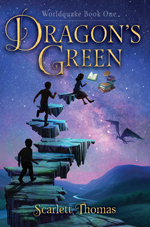 Euphemia (Effie) Truelove’s mother disappeared five years earlier during the Worldquake, which pitched the world back to pre-1992 technology. Now Effie faces a new loss when her grandfather, Griffin, is attacked in an alley. On his deathbed, he adds a codicil to his will, leaving his possessions to Effie, and whispers that she must find Dragon’s Green and protect his library of last editions. By that evening, her father, who hates magic and destroyed the codicil, has sold the library to an antiquarian bookseller. Although she doesn’t understand Griffin’s requests, she enlists the help of classmates from the Tusitala School for the Gifted, Troubled, and Strange, and assisted by some of her grandfather’s mystical artifacts, they embark on a dangerous quest to retrieve the books. Readers will be primed to read what happens next in this new fantasy series.
Euphemia (Effie) Truelove’s mother disappeared five years earlier during the Worldquake, which pitched the world back to pre-1992 technology. Now Effie faces a new loss when her grandfather, Griffin, is attacked in an alley. On his deathbed, he adds a codicil to his will, leaving his possessions to Effie, and whispers that she must find Dragon’s Green and protect his library of last editions. By that evening, her father, who hates magic and destroyed the codicil, has sold the library to an antiquarian bookseller. Although she doesn’t understand Griffin’s requests, she enlists the help of classmates from the Tusitala School for the Gifted, Troubled, and Strange, and assisted by some of her grandfather’s mystical artifacts, they embark on a dangerous quest to retrieve the books. Readers will be primed to read what happens next in this new fantasy series.
—NB
Our Story Begins: Your Favorite Authors and Illustrators Share Fun, Inspiring, and Occasionally Ridiculous Things They Wrote and Drew as Kids. Elissa Brent Weissman (Ed.) 2017. Atheneum/Simon & Schuster.
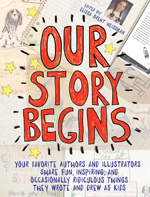 With contributors ranging in age, gender, and ethnicity, this book is an inspiring collection of vignettes in which 26 authors and illustrators give firsthand accounts of their early talent and accomplishments. They also impart advice and provide photos of their early artwork, prose, and poetry. Readers will find themselves drawn to the stories of certain authors and illustrators. For me, some highlights included Linda Sue Park’s poem “Fog by the Ocean,” written at age nine; Brian Selznick’s description of drawing characters from Star Wars at age eleven; and Rita Williams-Garcia’s accomplishment of completing 39 journals/sketchbooks with story ideas and conversations by age thirteen. Perfect for aspiring writers and illustrators of all ages, this anthology concludes with a list of suggestions such as “Read, read, read,” “Daydream, doodle, and let your imagination run wild,” and “Believe.”
With contributors ranging in age, gender, and ethnicity, this book is an inspiring collection of vignettes in which 26 authors and illustrators give firsthand accounts of their early talent and accomplishments. They also impart advice and provide photos of their early artwork, prose, and poetry. Readers will find themselves drawn to the stories of certain authors and illustrators. For me, some highlights included Linda Sue Park’s poem “Fog by the Ocean,” written at age nine; Brian Selznick’s description of drawing characters from Star Wars at age eleven; and Rita Williams-Garcia’s accomplishment of completing 39 journals/sketchbooks with story ideas and conversations by age thirteen. Perfect for aspiring writers and illustrators of all ages, this anthology concludes with a list of suggestions such as “Read, read, read,” “Daydream, doodle, and let your imagination run wild,” and “Believe.”
—NB
The Tiny Hero of Ferny Creek Library. Linda Bailey. Ill. Victoria Jamieson. 2017. Greenwillow/HarperCollins.
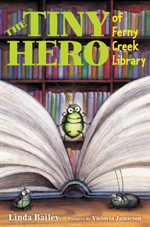 Eddie, a tiny green bug, lives with his family (including 53 siblings) behind the chalkboard in a fourth-grade classroom. When Aunt Min leaves and doesn’t return, Eddie sneaks out and locates her in the library. Overhearing the substitute librarian on the phone as she plans to turn the library into a technology lab, Eddie writes “please,” “save,” and “the library” on sticky notes that he presses onto various books. The students decide that these notes are from the ghost of the founding librarian, Miss Cavendish, who wants them to save the library. After Eddie’s aunt is accidentally locked in a desk drawer, Eddie writes one last note, “Open,” and leaves it on the desktop. Can Eddie’s bright ideas save both the Fern Creek library and Aunt Min? It will be a tough job for a little bug. Jamieson’s black-and-white illustrations complement Bailey’s clever adventure story. Eddie & Min’s Bugliography (a list of children’s books referenced in the story) is a nice addition.
Eddie, a tiny green bug, lives with his family (including 53 siblings) behind the chalkboard in a fourth-grade classroom. When Aunt Min leaves and doesn’t return, Eddie sneaks out and locates her in the library. Overhearing the substitute librarian on the phone as she plans to turn the library into a technology lab, Eddie writes “please,” “save,” and “the library” on sticky notes that he presses onto various books. The students decide that these notes are from the ghost of the founding librarian, Miss Cavendish, who wants them to save the library. After Eddie’s aunt is accidentally locked in a desk drawer, Eddie writes one last note, “Open,” and leaves it on the desktop. Can Eddie’s bright ideas save both the Fern Creek library and Aunt Min? It will be a tough job for a little bug. Jamieson’s black-and-white illustrations complement Bailey’s clever adventure story. Eddie & Min’s Bugliography (a list of children’s books referenced in the story) is a nice addition.
—NB
Ages 12–14
Books! Books! Books!: Explore the Amazing Collection of the British Library. Mick Manning & Brita Granström. 2017. Candlewick.
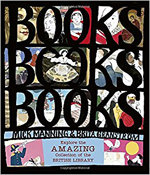 Manning and Grandström take readers on a tour of the British Library, the national library of the United Kingdom and “the greatest library in the world!” Spreads of watercolor-and-digital collage art incorporate photographs of work from the library’s archives and a docent-like narrative (with humorous touches) provide an engaging, accessible peek at the British Library’s treasure of books, documents, manuscripts, and more. Back matter includes notes on the twenty-one featured treasures, including the handmade St. Cuthbert Gospel, the oldest surviving book produced in Europe; the Magna Carta; the First Folio of William Shakespeare; the original manuscript of Lewis Carroll’s Alice’s Adventures in Wonderland; and the handwritten sheet music of Handel’s “Music for the Royal Fireworks.”
Manning and Grandström take readers on a tour of the British Library, the national library of the United Kingdom and “the greatest library in the world!” Spreads of watercolor-and-digital collage art incorporate photographs of work from the library’s archives and a docent-like narrative (with humorous touches) provide an engaging, accessible peek at the British Library’s treasure of books, documents, manuscripts, and more. Back matter includes notes on the twenty-one featured treasures, including the handmade St. Cuthbert Gospel, the oldest surviving book produced in Europe; the Magna Carta; the First Folio of William Shakespeare; the original manuscript of Lewis Carroll’s Alice’s Adventures in Wonderland; and the handwritten sheet music of Handel’s “Music for the Royal Fireworks.”
—CA
The Unbreakable Code (Book Scavenger #2). Jennifer Chambliss Bertram. Ill. Sarah Watts. 2017. Christy Ottaviano/Henry Holt.
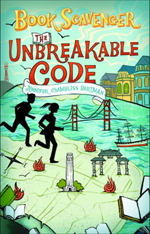 Twelve-year-old Book Scavenger celebrities Emily and James go sleuthing again when they suspect their social studies teacher, Mr. Quisling, is involved with a string of arson fires, triggered by encrypted messages in hidden, Mark Twain-penned books. The only way for them to be sure—and to stop Mr. Quisling—is to solve the Unbreakable Code, a Mark Twain cipher (with its alleged fire curse), and locate the treasure from the Niantic, a ship that burnt in the San Francisco harbor during the 1851 Gold Rush. They must find the hidden Twain books (and decipher their encrypted messages) and discover (and figure out) the treasure map in the History Center before Mr. Quisling does. Readers will want to solve the ingenious black-and-white codes and ciphers along with the characters in the book. An author’s note describes the historical events that inspired this book. If they haven’t already done so, readers will want to check out Book Scavenger (2015) while waiting for the next book in the series.
Twelve-year-old Book Scavenger celebrities Emily and James go sleuthing again when they suspect their social studies teacher, Mr. Quisling, is involved with a string of arson fires, triggered by encrypted messages in hidden, Mark Twain-penned books. The only way for them to be sure—and to stop Mr. Quisling—is to solve the Unbreakable Code, a Mark Twain cipher (with its alleged fire curse), and locate the treasure from the Niantic, a ship that burnt in the San Francisco harbor during the 1851 Gold Rush. They must find the hidden Twain books (and decipher their encrypted messages) and discover (and figure out) the treasure map in the History Center before Mr. Quisling does. Readers will want to solve the ingenious black-and-white codes and ciphers along with the characters in the book. An author’s note describes the historical events that inspired this book. If they haven’t already done so, readers will want to check out Book Scavenger (2015) while waiting for the next book in the series.
—NB
Ages 15+
Words in Deep Blue. Cath Crowley. 2017. Alfred A. Knopf/Random House.
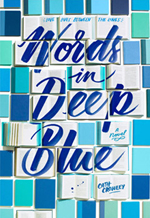 After failing Year 12, Australian eighteen-year-old Rachel, whose younger brother, Cal, recently drowned, is sent to live with her Aunt Rose in Gracetown. No one in Gracetown knows of the tragedy, and Rachel remains silent. She reluctantly goes to work at Howling Bookstore, a local bookshop owned by the family of Henry Jones—her unrequited childhood crush. While working on a Letter Library project cataloguing comments written in certain books, she learns new things about her brother Cal from a surprising source. When the bookstore goes up for sale and she realizes she doesn’t have time to finish the transcriptions, Rachel turns her new understanding of Cal into a surprising solution—and finally finds her voice. Ready to heal, she reaches out to a community ready to embrace her. Readers will champion Rachel in her journey of loss, friendship, and love in this beautifully written book about reclaiming life.
After failing Year 12, Australian eighteen-year-old Rachel, whose younger brother, Cal, recently drowned, is sent to live with her Aunt Rose in Gracetown. No one in Gracetown knows of the tragedy, and Rachel remains silent. She reluctantly goes to work at Howling Bookstore, a local bookshop owned by the family of Henry Jones—her unrequited childhood crush. While working on a Letter Library project cataloguing comments written in certain books, she learns new things about her brother Cal from a surprising source. When the bookstore goes up for sale and she realizes she doesn’t have time to finish the transcriptions, Rachel turns her new understanding of Cal into a surprising solution—and finally finds her voice. Ready to heal, she reaches out to a community ready to embrace her. Readers will champion Rachel in her journey of loss, friendship, and love in this beautifully written book about reclaiming life.
—NB
Nancy Brashear is Professor Emeritus of English from Azusa Pacific University, in Azusa, California. Carolyn Angus is former Director of the George G. Stone Center for Children's Books, Claremont Graduate University, in Claremont, California.